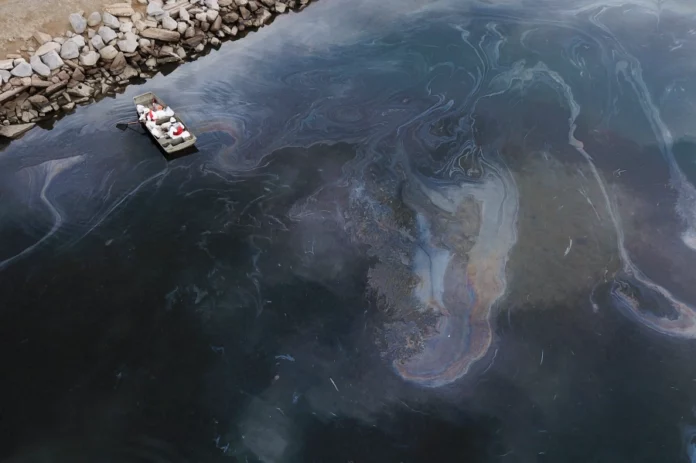Legal News Reporter: Samuel Lopez, USA Herald
Introduction: The Battle for Accountability
In a high-stakes legal battle surrounding the devastating SoCal oil spill, Marine Traffic Org., the maritime monitor for commercial traffic in San Pedro Bay, is fighting to extricate itself from the lawsuit filed by Amplify Energy Corp.’s insurers. Amplify Energy’s insurers claim that Marine Exchange of Southern California failed to inform the oil company about damage to its pipeline caused by container ships’ anchors.
Blame Games: Amplify Energy and the Container Ships
The oil leak that triggered this lawsuit occurred in October 2021 when Amplify Energy’s underwater pipeline released approximately 25,000 gallons of crude oil, resulting in severe environmental damage off the coast of Huntington Beach, California. Amplify Energy, facing litigation and seeking to deflect responsibility, pointed fingers at two container ships, MSC Danit and Cosco Beijing. According to Amplify Energy, these ships negligently dragged their anchors across the seafloor, causing damage to the pipeline. In addition, Amplify Energy accused Marine Exchange of failing to notify them of the pipeline’s compromised state, further exacerbating the issue.
Marine Exchange’s Plea for Immunity
Marine Exchange of Southern California, the organization responsible for monitoring vessel traffic in San Pedro Bay, has adamantly defended itself against the insurers’ claims. In a motion recently filed, Marine Exchange has requested summary judgment, asserting that it should not be held responsible for informing Amplify Energy of pipeline damage. The marine traffic monitor argues that it cannot be reasonably expected to fulfill this duty and continue its maritime operations without the immunity it believes it deserves.
Derivative Sovereign Immunity and Legal Responsibility
Marine Exchange maintains that it operated under the supervision of the U.S. Coast Guard, carrying out vessel traffic service operations for the Ports of Long Beach and Los Angeles. While Amplify Energy’s insurers and Amplify Energy itself have named Marine Exchange as a party in the lawsuit, Marine Exchange argues that it should be shielded from liability. The organization points to its derivative sovereign immunity as a government contractor, emphasizing that the ultimate responsibility for the vessel traffic service lies with the Coast Guard, as explicitly recognized by California legislation.
Challenging the Creation of Duty
Marine Exchange highlights key factors in its defense. First, it asserts that Amplify Energy was never a user of the vessel traffic service, and there was no prior communication between the parties. Marine Exchange argues that neither the Coast Guard nor Marine Exchange had a legal obligation to notify Amplify Energy of marine incidents. Without an existing duty, Marine Exchange contends that the court should not impose one on Marine Exchange to protect third parties like Amplify Energy from harm.
Furthermore, Marine Exchange emphasizes that its actions were carried out in accordance with the instructions provided by the Coast Guard. As a result, Marine Exchange believes it should be granted derivative sovereign immunity as a government contractor, shielding it from the allegations of negligence.
Holding them Accountable: MSC Danit, Cosco Beijing, and Marine Exchange
It is essential not to overlook the actions of MSC Danit and Cosco Beijing, the two container ships implicated in the oil spill. The negligent lowering of their anchors, causing damage to the underwater pipeline, cannot be dismissed lightly. These companies, subsidiaries of the Chinese Communist Party, must be held accountable for their actions and compelled to provide compensation for the extensive damage they have caused.
Additionally, Marine Exchange’s role in the incident cannot be ignored. As the organization responsible for monitoring vessel traffic, Marine Exchange has a duty to uphold safety standards and inform relevant parties of potential risks. Any failure to fulfill this duty warrants scrutiny and potential legal repercussions.
The Pursuit of Justice
In the midst of this complex legal battle, it is crucial to recognize the broader patterns of behavior exhibited by insurance companies. Markel International Insurance Co., known for its efforts to avoid payouts even when justified, is one such example. Their involvement in this case raises questions about their commitment to supporting policyholders and fulfilling their obligations.
As the legal proceedings continue, the pursuit of justice for the environmental damage caused by the SoCal oil spill remains paramount. It is imperative that the court carefully examines the actions of all parties involved, ensuring accountability and fair compensation for those affected.
In the words of Samuel Lopez, USA Herald’s Legal News Reporter: “This case underscores the ongoing struggle for policyholders to obtain the coverage they are entitled to, with insurance giants often prioritizing profit over fulfilling their obligations. The actions of MSC Danit, Cosco Beijing, and Marine Exchange cannot be overlooked, and those responsible must be held accountable for their actions.”






